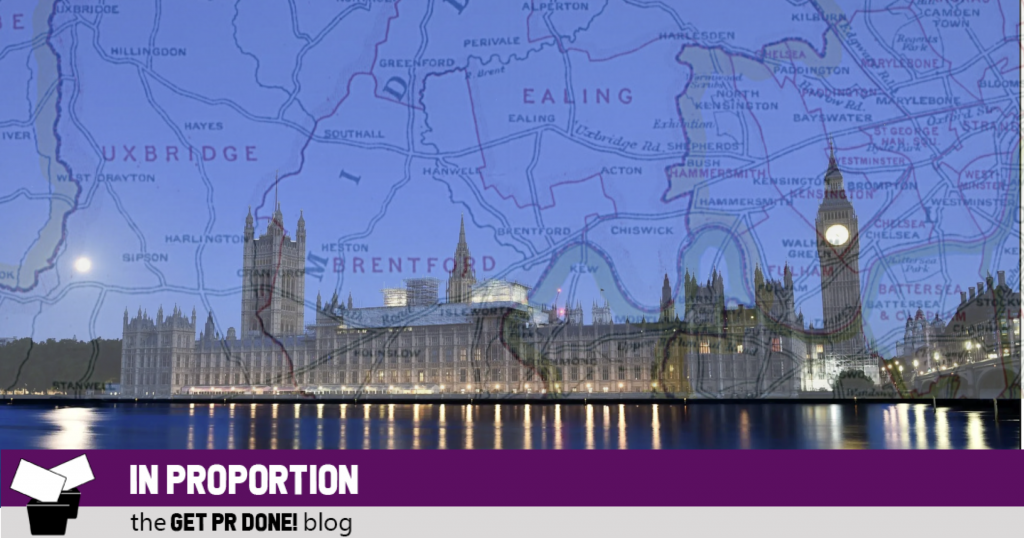
‘I cannot support a system that breaks the constituency link’
How many times have we all heard that one? It is one of the oldest lines trotted out in support of the winner-takes-all system.
And it’s often deployed by MPs elected under that very system, in reply to constituents asking them to support a move to a fairer one: ‘I cannot support a system that breaks the constituency link’. As they write these words, you can almost imagine their hands clasped in pious prayer as they offer thanks for the method of false accounting that put them where they are – and which, in safe seats, can be relied upon to keep them there.
Apart from the large helpings of humbug, this is also one of the tritest and falsest objections to a fairer electoral system because almost all proportional systems do maintain a link between representatives and particular areas (the only exceptions being the system used in Israel, where the whole country is treated as a single constituency, and the Netherlands also).
What proportional systems don’t do, however, is create a link that is exclusive to one MP. This is because, whatever the system, they all involve the creation of multi-member seats – and it is this that the ‘constituency link’ fetishists are really objecting to. Basically, they want to be the only show in town (or city, or village), and are scared of genuine competition.
Multi-member seats mean that any individual elector has more than one member of parliament to represent them. If they need to turn to a MP for any kind of assistance or to make a particular point, they have a choice of whom to approach. More fundamentally, it raises the chances that people will genuinely feel themselves to be properly represented in Parliament by someone whose views at least slightly resemble their own. Campaigners for PR have not done enough to trumpet this as a virtue.
While certain MPs may (rather pompously) claim that there is some kind of umbilical link between themselves and their constituents, the widespread evidence of political disillusion shows that this is a case of unrequited love. Some surveys have found that less than a quarter of people can even name their MP.
Tony Benn – an opponent of proportional representation – said that, as an MP, one was ‘employed by the people who vote for you. In my constituency, everyone I met was my employer.’ The slight problem there, of course, is that not everyone *did* vote for him. Far from it: in three of the four elections he fought for Chesterfield, more than half of the voters would have preferred someone else.

It’s nonsense anyway to suppose that any single MP can properly represent all shades of opinion in any given geographical area. In what way, politically, did Tony Benn represent those of Conservative opinions among his constituents in Chesterfield and Bristol? Today, for example, how can Steve Baker represent pro-Europeans in Wycombe?
And then there are the single-member constituencies themselves – fantastic geographical beasts carved from the map by the boundary commission, often linking areas that have no real community of interest and bearing names that will leave many scratching their heads.
A recent development is that ancient county boundaries that do actually have some cultural and historical significance are being ignored in favour of creating ‘equal electoral districts’ (but never mind the equal representation of the actual people living there). People do feel some sense of belonging to Yorkshire, or Devon; they are infinitely less attached to artificial creations such as Wyre and Preston North, Farnham and Bordon, or Sleaford and North Hykeham.
It’s time we came out fighting against single-member seats as a bad idea in themselves – as well as arguing that their elimination is vital to achieve a clearer match between votes and seats, and something closer to true democracy.
The boundary commission is key to the success of proportional representation based on multi-member constituencies. The electoral map has recently been redrawn to create ‘equal electoral districts’. This ignores cultural and historical ties and should be reversed.
What is wrong with using local government boundaries in order to define multi-member constituencies? Electors in each county share an ancient bond and, importantly, they all pay tax to the same local authority.
The same is true of cities: people proudly identify with the area in which they live. What could be more sensible than a group of MPs representing Liverpool, Manchester or Birmingham? London is so large that it would have to be broken up. What about dividing Greater London using the old home county boundaries, ie Middlesex, Hertfordshire, Essex, Kent and Surrey?
In addition, the boundary commission should be given a new job: to define ‘super-wards’ within each constituency. It would be logical to base these on parish boundaries. The interests of each super-ward could then be represented by a single MP,
This would keep the constituency link very much alive!